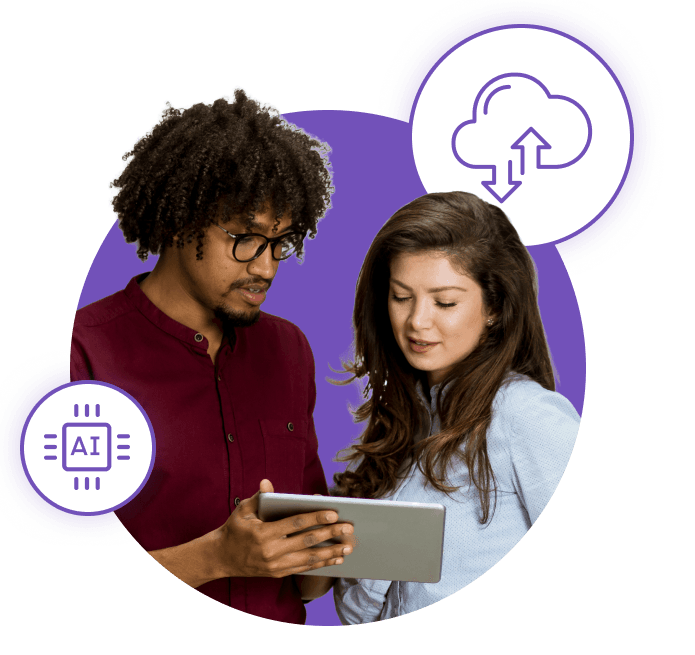HR digital transformation solutions
We can help you modernise HR processes, structure, and strategy - implementing HR digital transformation solutions and enabling agile, data-driven people functions that are future ready, inclusive, and aligned with business goals.

Get in touch with one of our HR transformation specialists
Send an overview of your requirements and we'll discuss your company's needs.

Overview
As the pace of work accelerates, so must the evolution of your people strategy. We will help you align your operating models, technology, and workforce capabilities to meet the demands of tomorrow, today.
Our HR digital transformation service delivers end-to-end support for the digital transformation of people and talent functions. From rec-tech procurement and implementation to future skills AI and automation, we empower you to modernise how your organisation attracts, manages, and develops your people.
With decades of experience across outsourced recruitment, technology implementation, and change management, our approach is rooted in both strategic insight and operational expertise.
We combine HR technology consultancy with access to rich workforce data and deep practical knowledge of emerging HR tech, helping you:
Streamline people processes through automation and AI -integrating ethical AI tools into your people strategy
Futureproof workforce capabilities through targeted skills planning
Optimise your organisational structure for performance and agility
Enhance candidate experience and hiring outcomes through digital enablement
Whether you need ad-hoc expertise or a strategic delivery partner, our model offers flexibility and depth, giving you immediate access to capabilities without the overhead of expanding your HR team during times of transformation.
HR technology consultancy
HR & talent-tech consultancy: from procurement to implementation…
The right people and talent technology is a game-changer - but only when it’s chosen wisely and implemented effectively. We support organisations throughout the entire digital transformation lifecycle of their people function:
Technology strategy and vendor selection: identifying the tools that match your organisation’s current and future needs
Procurement support: managing the tender and contract process to ensure value for investment
Implementation project management: co-ordinating vendors, internal teams, and timelines to ensure seamless delivery
System integration and process redesign: aligning new tools with your people, processes, and data flows
Change management and adoption: driving stakeholder buy-in, training, and end-user engagement to maximise uptake
Whether it’s an applicant tracking system (ATS), human resources information system (HRIS), onboarding platform or AI-driven screening solution, our delivery experts ensure the technology fits your organisational needs and that your people are ready to embrace it.
Organisation change
Technology alone doesn’t transform organisations - people and structure do. Our team helps you shape an organisational model that supports future growth, resilience, and inclusion.
Our services include:
Organisation design: redefining team structures, spans of control, and capability models for modern working
Change management: supporting leadership and employees through transformation with communications, training, and stakeholder engagement
Leadership and workforce development: tailored training and coaching to build resilient, future-ready leaders
Reward and performance strategies: designing frameworks that drive engagement and recognise contribution in evolving workplaces
Equity, diversity & inclusion (ED&I): embedding inclusive practices and policies that reflect your values and meet regulatory and cultural expectations
Our holistic approach ensures your organisational infrastructure is not just functional but futureproofed.
Future skills
Helping you plan for now and the future…
Rapid innovation demands an agile, skilled workforce. We support organisations to anticipate future talent needs and bridge skill gaps through flexible and scalable workforce development models.
We offer:
Technology apprenticeship and early careers programmes: designed to build foundational skills in areas like digital, data, and customer experience
Targeted training solutions: upskilling and reskilling your existing workforce with the right digital skills to meet emerging demands
Recruit, train, deploy (RTD): Rapidly developing new tech talent pipelines by sourcing candidates, delivering role-specific training, and deploying them directly into your organisation
Whether you’re preparing for AI integration, digital process redesign, or data transformation, we ensure you have the right people with the right skills in place, fast.
Why choose us?
From strategy and procurement to implementation and adoption, our experts manage the full lifecycle of HR and recruitment technology change.
Our unique combination of digital consultancy, talent advisory, and workforce data ensures practical, future-ready solutions.
Engage us for standalone projects or as a strategic partner, without expanding your core team during periods of change.
Deep expertise in change management, organisational design, and leadership development ensures transformation is embedded and sustained.
Case studies
Latest insights
FAQs
HR digital transformation is the shift from traditional HR practices to digital-first approaches using technologies like cloud platforms, AI, and data analytics. It streamlines operations, automates repetitive tasks, and enhances employee experiences through personalised tools and self-service options.
Digital human resources transformation will improve efficiency, enable better data-driven decision-making, and help your company adapt to modern work environments like remote and hybrid models. By embracing digital HR strategies, businesses can stay competitive, attract talented employees, and position themselves as forward-thinking employers.
HR technology plays a transformative role in modern recruitment and talent management by streamlining processes, enhancing decision-making, and improving the overall candidate and employee experience. In recruitment, tools like applicant tracking systems (ATS) automate repetitive administrative tasks such as CV screening, interview scheduling, and email communication – overall this can reduce time and costs and allow TA professionals to focus on the more strategic aspects of recruitment. Additionally, AI-powered platforms can analyse CVs and job descriptions to match candidates more accurately based on skills, experience, and cultural fit, helping you to make better hiring decisions while minimising unconscious bias.
Beyond recruitment, HR technology significantly enhances talent management. Performance management systems enable continuous feedback and real-time goal tracking, fostering a culture of accountability and growth. Learning and development platforms offer personalised training paths, supporting employee upskilling and career progression. These tools not only boost engagement but also help retain your best employees by aligning individual aspirations with organisational goals.
HR analytics also play a crucial role in monitoring employee engagement and satisfaction. Tools that conduct pulse surveys and sentiment analysis provide actionable insights into workforce morale, enabling timely interventions to improve workplace culture. When integrated into a unified HR ecosystem, these technologies offer scalability and seamless coordination across payroll, benefits, compliance etc. - making them indispensable if your company is looking to stay competitive in a rapidly evolving talent landscape.
One of the biggest challenges in implementing digital HR transformations is managing the cultural and organisational resistance to change. Employees and HR professionals may be hesitant to adopt new technologies due to fear of job displacement, lack of digital skills, or uncertainty about the benefits. Additionally, integrating new systems with existing legacy infrastructure can be technically complex and costly, often requiring significant time and resources. Ensuring data privacy and compliance with regulations adds another layer of difficulty, especially when handling sensitive employee information. Finally, without clear strategic alignment and leadership support, digital initiatives can struggle to gain traction, leading to fragmented efforts and underwhelming results. By using Reed Talent Solutions as your HR digital transformation partner you can rest assured these challenges will be tackled head on, making your transformation seamless.
Choosing the right HR technology for your organisation involves aligning the tool with your strategic goals, workforce needs, and existing infrastructure. There ar so many tools available on the market, you should start by clearly identifying the specific HR challenges you want to address - such as improving recruitment, enhancing employee engagement, or streamlining performance management. Then, involve key stakeholders from HR, IT, and leadership to define must-have features and integration requirements.
When it comes to evaluating potential solutions, you will need to consider scalability, user-friendliness, data security, and vendor support. It’s also important to consider the total cost of ownership, including implementation, training, and maintenance. Finally, it’s a good idea to pilot the technology with a small group to gather feedback and ensure it fits your organisational culture before purchasing a solution.
In the ever-changing working world, HR teams need to be on their toes and at the fore of shifts in workforce trends and needs. HR professionals need a blend of technical, strategic, and interpersonal skills that align with the evolving demands of the workplace.
Key among these is digital literacy, including familiarity with HR technologies like AI-driven analytics, cloud platforms, and automation tools. HR professionals must also develop data-driven decision-making skills to interpret workforce analytics and translate insights into actionable strategies. Equally important are change management and agility, enabling HR teams to lead organisational transformation and adapt quickly to shifting business needs.
Strong communication and collaboration skills remain essential, especially in hybrid and global work environments. They should also cultivate strategic thinking to align talent initiatives with broader business goals, and inclusivity and empathy to foster diverse, equitable, and supportive workplaces. Lastly, a commitment to continuous learning ensures HR teams stay ahead of trends and innovations in workforce management.







